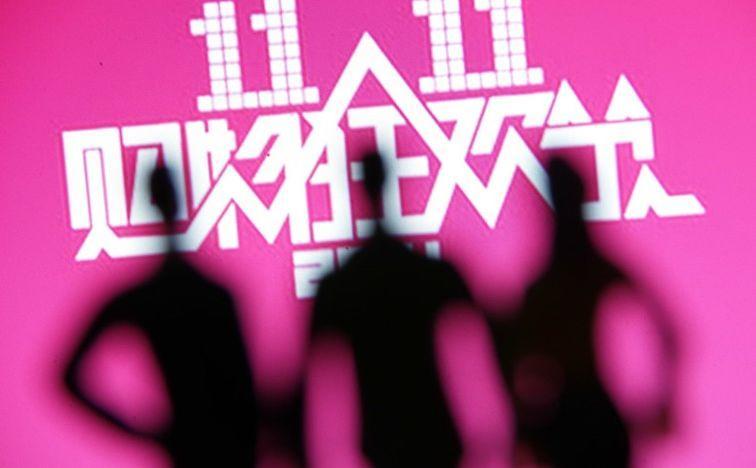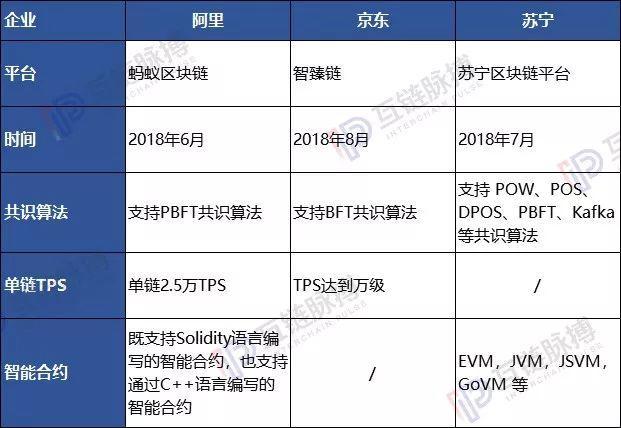Ali, Jingdong, Suning, "chain" battle double eleven
Text: Mutual chain pulse · Golden car
Source: Interchain Pulse
Editor's Note: The original title is "Ali, Jingdong, Suning double eleven "chain" war"
This year, the double 11 seems to be different from the past. With the deeper integration of e-commerce and blockchain, the drum of the “technical war” between e-commerce platforms has officially sounded.
- Babbitt Column | Blockchain/Digital Currency: Analysis of Legality of Currency Trading
- Does the central bank have a timetable for launching digital currency? Zhou Xiaochuan, former president of the People's Bank of China, responded
- Wuzhen·Ant Jinfu Li Jieli: Open the alliance chain to open the public beta and build a network chain of alliance chain
Not only Ali, Jingdong and other platforms have corresponding blockchain layout. Suning also announced the "blockchain traceability" anti-counterfeiting technology at this year's double 11 conference. He also said that Suning International will use the blockchain technology to mark “identity cards” for each newly purchased cross-border imported goods.
Looking back at the double 11 of the previous 10 years, from the price war, logistics war to propaganda war, it is basically the continuous innovation of the business model of each platform. This year, the 11th year of the double 11, further ushered in new technologies such as blockchain, and officially became a "technical war" between e-commerce platforms. The use of blockchain technology has become a manifestation of the technical strength of each platform, and has also become a way for platforms to attract users.
Mutual chain pulse observation, in fact, from the "618" shopping festival last year, Ali, Jingdong, Suning and other platforms have been using the blockchain for product traceability.
With the recent technical conditions and policy conditions becoming more mature, the "chain war" of the double 11 head e-commerce platform this year has become increasingly fierce.

Three shopping festivals in two years: witnessing the "blockchain war history" of the head e-commerce platform
The sales of Double 11 are normal every year. In 2018, the turnover of Tmall exceeded 200 billion yuan, reaching 213.5 billion yuan, while the turnover of Jingdong was 159.8 billion yuan.
Behind this lively carnival, there seems to be always a concern: whether the goods purchased are genuine, whether the goods will be shoddy… This plagues consumers, and also plagues e-commerce platforms. Therefore, the use of blockchain technology that can guarantee the authenticity of data has become the key to the traceability of commodities on various platforms, and has gradually opened the prelude of “technical warfare”.
And this battle really began in the "618" of 2018.
At that time, the blockchain anti-counterfeiting traceability platform of Jingdong District focused on maternal and child, global purchase, alcohol and other categories. It is reported that from June 1 to June 18, Jingdong's blockchain anti-counterfeiting traceable goods sold by the company increased by more than 200 times.
Jing Jian, vice president of Jingdong Group, revealed that Jingdong Blockchain Anti-Counterfeiting Traceability Platform, which was built using blockchain technology, has attracted more than 400 domestic and foreign brands to cooperate, achieving more than 11,000 key commodities traceable throughout the course, over 1 billion pieces. Trace back the goods.
At the same time, Suning Tesco also launched a self-developed blockchain commodity traceability system in online and offline stores, and double-line guarantees the quality of goods. According to Suning, the blockchain commodity anti-counterfeiting traceability application technology not only supports the use of Suning Tesco online products, but also has been widely used in Suning's offline stores.
After the double 11 in 2018, Ali opened the "all-round" mode.
Although, the time to put the blockchain on the shopping festival is later than Jingdong and Suning. But in fact, Ali's layout in the traceability of the blockchain is earlier than the two. In March 2017, Alibaba worked with PricewaterhouseCoopers to create a traceable cross-border food supply chain.
On the eve of the Double 11 in 2018, Alibaba's Ant Financial Service officially announced that it will apply the blockchain technology scale to the Tmall Double 11 for the first time, marking the world's 150 million cross-border products.
In this battle, the representative of the ant was introduced by the Belgian diamond. On November 5, 2018, Tmall and the Antwerp Diamond Exchange in Belgium reached a cooperation. All diamonds will pass the Tmall intelligent traceability system, using the ant blockchain technology and Ali Health's “code-safe” traceability coding technology to clearly show the diamond procurement and identification, cross-border transportation, entry clearance, diamond inlay and finished product identification. . In other words, each diamond has an "identity card."
On the other hand, Jingdong also said that through the “Jingdong blockchain anti-counterfeiting traceability platform”, it has access to many domestic and foreign brands and achieved 1.2 billion data uplinks. Among them are Wuchang rice, Maotai, Pingwu honey and other commodities.
In a blink of an eye, I came to "618" this year.
Although, e-commerce platforms are low-key in the traceability of blockchain, no further publicity has been made. However, Mutual Chain Pulse has communicated with the relevant person in charge of Jingdong “Zhizhi Chain” and the members of Ant Financial Group Block Chain. It is understood that during the “618” period in 2019, both Ali and JD have applied blockchain technology to the product traceability process. in.
At this point, the battle of the blockchain traceability of the head e-commerce platform has been practiced in three shopping festivals for two years.

This year's double 11: blockchain dark corner power e-commerce platform focuses on different
With the arrival of the "fourth war" of the e-commerce platform blockchain, Suning also made a strong voice.
On October 21, Suning announced the anti-counterfeiting technology of “blockchain traceability” at the double 11 conference. Jing Wei, executive vice president of Suning Technology, said that through blockchain technology, Suning International has issued an “ID card” for each newly purchased cross-border imported product. During the double 11 period this year, Suning International will also launch a “National Safeguard Alliance” with a number of cross-border brands including Kao, Swisse, SPA and ISDG, and release “100 million consumer rights protection funds”.
On November 5th, Jia Meng, Strategic Director of Suning International Group's International Business Development Center, introduced at a signing ceremony that Suning International started blockchain technology in May this year, importing cross-border imports for each new purchase. The product is branded with a unique "identity card." At present, Suning International Blockchain technology has covered more than 50% of commodities.
Jingdong Digital has also recently released the latest data. It shows that up to now, the blockchain anti-counterfeiting and traceability platform of Jingdong District has accumulated more than 1.3 billion uplink data, and has traced cooperation with more than 700 brands, with a total of more than 60,000 SKUs. Entered, more than 6 million after-sales users access the query.
Inter-chain pulse observation, although several major e-commerce platforms are using blockchain technology to serve the source of goods, but the direction of the focus is slightly different.
The main battlefields of Ali and Jingdong are online scenes. Both have traced the imported foreign milk powder, beauty makeup, health products, luxury jewelry, China's Maotai and other high-end wines, Wuchang rice, Pingwu honey and other products. At the same time, the Philip's main push of Belgian diamonds; Jingdong has launched the "running chicken", mostly with "expensive" and "lean" characteristics of goods.
As a veteran retailer transforming integrated e-commerce, Suning has fully utilized its overseas localization supply chain and the advantages of online and offline shopping malls, and combined with blockchain technology to trace the source. It can be seen that although the application scenario of the blockchain traceability is the same, the development path of each e-commerce platform still has certain differences.
In addition to the above-mentioned e-commerce platform in the large-scale layout blockchain field, the inter-chain pulse has observed that Vipshop has already begun to explore the blockchain. Its incubating “chain-free+” team participated in the Thunder Global Blockchain Application Competition held in July 2018 and won the second prize. The “Mingzhaotai” project participating in the competition is a cloud service platform that provides blockchain-passengage economic empowerment for production and marketing enterprises. The application scenarios include the field of commodity traceability.
But so far, there is no relevant information disclosure, Vipshop will use the blockchain to trace the source of goods during the shopping festival. The focus of this year's Double 11 battle will still be the three platforms of Ali, Jingdong and Suning.
Blockchain technology of the three platforms: the next decade to help double 11
The competition of the platform, in the final analysis, is actually a confrontation of the technical strength of the platform.
Mutual chain pulse statistics, the blockchain platform of the three major e-commerce platforms were launched in mid-2018. The ant blockchain supports the PBFT consensus algorithm; the Zhiyi chain supports the BFT consensus algorithm; the Suning blockchain supports the consensus algorithms such as POW, POS, DPOS, PBFT, and Kafka. At present, the TPS of the ant blockchain and the Zhisheng chain have reached 10,000, and the ant blockchain platform has reached a single chain of 25,000 TPS.

(tabulation: interchain pulse)
Ali and JD.com's blockchain traceability is based on the blockchain BaaS platform of each family, making full use of its advantages in logistics, supply chain, e-commerce sales, digital technology, and development of blockchain anti-counterfeiting verification.
Among them, Ali is a blockchain solution that combines Alibaba Cloud Internet of Things, anti-counterfeiting labels, etc., and proposes a multi-party confirmation, non-tamperable shared traceability information and full-process transaction history records, supporting consumers and regulatory authorities to conduct inquiries. Verification and auditing, while supporting multiple levels of information sharing to ensure business privacy.
Jingdong is an anti-counterfeiting retrospective open platform that combines anti-counterfeiting with anti-counterfeiting and full chain closed-loop big data analysis through the combination of Internet of Things and blockchain technology, combined with big data processing capabilities, and supervision departments, third-party organizations and brands. The platform is based on blockchain technology, and maintains secure and transparent traceability information together with members of the alliance chain to establish a technology mutual trust mechanism to ensure data irreparability and privacy protection.
Suning is different. In July 2018, when Suning released the blockchain white paper, Yao Ping, technical director of the Suning Cloud blockchain R&D center, revealed that the Suning blockchain platform supports the alliance chain and private chain business. The alliance chain is based on the super-bookfare fabric alliance chain technology, and the private chain is based on Ethereum technology.
Suning International launched the blockchain commodity traceability system in 2018. The system conducts DNA-based label tracking records on the production, processing, transportation, circulation and retail of commodities, and integrates all links of the industrial chain in the form of nodes. In the public information released recently, Suning also mentioned that in order to ensure that the goods are genuine at the source, Suning will rely on its overseas localization supply chain.
But in fact, despite the strong help of blockchain technology, it is impossible to completely eliminate the phenomenon of counterfeit goods in the e-commerce platform shopping process.
On the one hand, the blockchain can guarantee that the information entered cannot be falsified, but the authenticity of the information entered cannot be fully guaranteed. In the process of production, transportation and sales of goods, there is a large amount of information entry, so there is still the possibility of information fraud. On the other hand, the blockchain of e-commerce platforms is not completely decentralized. Most of them are centralized models, and there is also the possibility that the platform side is the counterfeit party.
However, with the technical competition between e-commerce platforms and their respective technology upgrades, this phenomenon is improving, and the blockchain can release more energy in large-scale application scenarios such as the Double 11 Shopping Festival.
In 2008, Nakamoto published a white paper on Bitcoin, and blockchain technology began to develop. It has been 11 years since.
In 2009, Singles Day was first defined as a shopping carnival, and this year is also the 11th year.
In the past ten years, the blockchain and e-commerce shopping festivals have gradually traced the source of goods; in the next decade, the product traceability of each e-commerce platform will be more closely integrated with the blockchain technology.
This article is [inter-chain pulse] original, please indicate the source!
We will continue to update Blocking; if you have any questions or suggestions, please contact us!
Was this article helpful?
93 out of 132 found this helpful
Related articles
- Li Ming, Ministry of Industry and Information Technology: China's blockchain standardization system has been in the forefront of the world, and is working on the development of the first blockchain national standard.
- When the blockchain encounters AI, is 1+1 greater than 2 or empty negative encounter?
- The global buying and buying of the Expo, cross-border trade opportunities in the blockchain
- PricewaterhouseCoopers analyst: The traceability of the blockchain is just "illusion"
- Economic Daily: Blockchain, down-to-earth to a bright future
- Max Keiser: Bitcoin’s “self-settlement” attribute challenges the dollar
- Dragon White: Is it difficult to get out of it? Global Stabilization Currency Risks and Challenges






